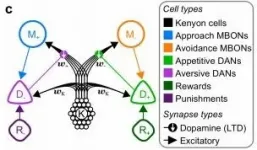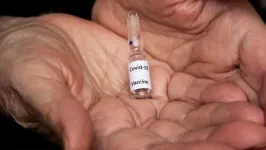Learning on the fly
Computational model demonstrates similarity in how humans and insects learn about their surroundings
2021-05-07
(Press-News.org) Even the humble fruit fly craves a dose of the happy hormone, according to a new study from the University of Sussex which shows how they may use dopamine to learn in a similar manner to humans.
Informatics experts at the University of Sussex have developed a new computational model that demonstrates a long sought after link between insect and mammalian learning, as detailed in a new paper published today in Nature Communications.
Incorporating anatomical and functional data from recent experiments, Dr James Bennett and colleagues modelled how the anatomy and physiology of the fruit fly's brain can support learning according to the reward prediction error (RPE) hypothesis.
The computational model indicates how dopamine neurons in an area of a fruit fly's brain, known as the mushroom body, can produce similar signals to dopamine neurons in mammals, and how these dopamine signals can reliably instruct learning.
The academics believe that establishing whether flies also use prediction errors to learn could lead to more humane animal research allowing researchers to replace animals with more simple insect species for future studies into the mechanisms of learning.
By opening up new opportunities to study neural mechanisms of learning, the researchers hope the model could also be helpful in illuminating greater understanding of mental health issues such as depression or addiction which are underpinned by the RPE hypothesis.
Dr Bennett, research fellow in the University of Sussex's School of Engineering and Informatics, said: "Using our computational model, we were able to show that data from insect experiments did not necessarily conflict with predictions from the RPE hypothesis, as had been thought previously.
"Establishing a bridge between insect and mammal studies on learning may open up the possibility to exploit the powerful genetic tools available for performing experiments in insects, and the smaller scale of their brains, to make sense of brain function and disease in mammals, including humans."
Understanding of how mammals learn has come a long way thanks to the RPE hypothesis, which suggests that associative memories are learned in proportion to how inaccurate they are.
The hypothesis has had considerable success explaining experimental data about learning in mammals, and has been extensively applied to decision-making and mental health illnesses such as addiction and depression. But scientists have encountered difficulties when applying the hypothesis to learning in insects due to conflicting results from different experiments.
The University of Sussex research team created a computational model to show how the major features of mushroom body anatomy and physiology can implement learning according to the RPE hypothesis.
The model simulates a simplification of the mushroom body, including different neuron types and the connections between them, and how the activity of those neurons promote learning and influence the decisions a fly makes when certain choices are rewarded.
To further understanding of learning in fly brains, the research team used their model to make five novel predictions about the influence different neurons in the mushroom body have on learning and decision-making, in the hope that they promote future experimental work.
Dr Bennett said: "While other models of the mushroom body have been created, to the best of our knowledge no other model until now has included connections between dopamine neurons and another set of neurons that predict and drive behaviour towards rewards. For example, when the reward is the sugar content of food, these connections would allow the predicted sugar availability to be compared with the actual sugar ingested, allowing more accurate predictions and appropriate sugar-seeking behaviours to be learned.
"The model can explain a large array of behaviours exhibited by fruit flies when the activity of particular neurons in their brains are either silenced or activated artificially in experiments. We also propose connections between dopamine neurons and other neurons in the mushroom body, which have not yet been reported in experiments, but would help to explain even more experimental data."
Thomas Nowotny, Professor of Informatics at the University of Sussex, said: "The model brings together learning theory and experimental knowledge in a way that allows us to think systematically how fly brains actually work. The results show how learning in simple flies might be more similar to how we learn than previously thought."
INFORMATION:
[Attachments] See images for this press release:

ELSE PRESS RELEASES FROM THIS DATE:
2021-05-07
PITTSBURGH, May 7, 2021 - In a paper published today in Nature Communications, an international group of collaborators led by researchers at UPMC Children's Hospital of Pittsburgh have identified a genetic cause of a rare neurological disorder marked by developmental delay and loss of coordination, or ataxia.
The disorder, scientists found, is caused by mutations in a protein called GEMIN5--one of the key building blocks of a protein complex that controls RNA metabolism in neurons. No mutations in GEMIN5 were previously linked to any genetic disease. ...
2021-05-07
Luxembourg, 7 May 2021 - In a new position statement, Alzheimer Europe has issued a call for prioritisation of people with dementia and their carers in national COVID-19 vaccination strategies, urging governments to recognise the disproportionate effect of the pandemic on these groups.
Alzheimer Europe has today issued a call for people with dementia and their carers to be given priority in the ongoing COVID-19 vaccination campaigns across Europe.
In its position statement, Alzheimer Europe notes that people with dementia have almost twice the risk for developing COVID-19 compared to their ...
2021-05-07
Systemic inequalities mean that low-income households in London are more likely to be exposed to higher levels of indoor air pollution, according to a report by UCL researchers.
The biggest factors are the quality of housing and the characteristics of the surrounding environment, taking location and levels of outdoor air pollution into account - factors beyond occupants' control.
Air pollution exposure is the greatest environmental health threat in the UK, with long-term exposures estimated to cause 28,000-36,000 premature deaths a year.
In the paper, published in Buildings and Cities, researchers used available data and models, assembling evidence to examine five factors explaining why lower socio-economic groups may be exposed to higher levels of indoor air pollution ...
2021-05-07
LUGANO, 7 May, 2021- Findings presented at today's EADV 2021 Spring Symposium suggest that an imbalance in gut microbiota (dysbiosis), could play a significant role in the progression of inflammatory skin disease, Hidradenitis Suppurativa (HS). HS is a painful, long-term skin condition, with a chronic and relapsing nature that significantly impacts patients' quality of life.
Researchers at Hacettepe University collected faecal samples from 15 patients with HS and 15 age and sex matched healthy individuals and analysed regions of the bacterial 16S rRNA gene to investigate ...
2021-05-07
LUGANO, 6 May, 2021- The dermatological impact of COVID-19 is a burning topic at EADV's 2021 Spring Symposium. New research presented today highlights the effect that stringent hand hygiene during the pandemic has had on hand skin health.1
Researchers at Father Muller Medical College, India, analysed transepidermal water loss (TEWL - an essential parameter for measuring skin barrier function) from 582 people (291 healthcare professionals (HCPs) and 291 healthy individuals from the general population). Results indicated that hand dermatitis was now present among 92.6% of HCPs and 68.7% of the general population, despite only ~3% of HCPs and 2.4% of the general public in the study having reported a prior history of hand dermatitis (obtained through medical history ...
2021-05-07
Are penalty shots a soccer player's dream or nightmare? What should be an easy shot can become a mammoth task when the hopes and fears of an entire nation rest on a player's shoulders, leading them to choke under pressure. Understanding the brain activity behind choking is the driving force behind a new study in open-access journal Frontiers in Computer Science. The study is the first to measure brain activity during penalty shots in a soccer pitch environment. It finds that people who choked activated areas of the brain involved in long-term thinking, suggesting that they were overthinking the consequences of missing the shot. ...
2021-05-07
Researchers from University of Southern California, Bocconi University, and Vrije Universitei Amsterdam published a new paper in the Journal of Marketing that explains the six types of judgements consumers make when determining a product's authenticity and how marketers can use this insight to deliver more authentic offerings.
The study, forthcoming in the Journal of Marketing, is titled "The Concept of Authenticity: What it Means to Consumers" and is authored by Joseph Nunes, Andrea Ordanini, and Gaia Giambastiani.
Consumers crave authenticity. Yet marketing itself is typically considered inherently inauthentic. Hence, firms must learn to understand, manage, and excel at rendering authenticity. The critical question is: how? Marketers who wish to deliver authentic consumption experiences ...
2021-05-07
INDIANAPOLIS - As electronic medical records (EMRs) are increasingly used across the United States, the next generation of physicians, nurses, social workers, pharmacists and other clinicians need to acquire new knowledge and competencies related to use of EMRs early in their clinical education. But training is not routinely provided.
A new study presents the functions and application of the novel, scalable Regenstrief teaching electronic medical record (tEMR) platform which contains a unique, large, anonymized patient database enabling health professions students to learn how to use health information technology (HIT) to best manage the ...
2021-05-07
The way that many of us live has created the "perfect storm" for the evolution and transmission of infectious diseases like Covid-19 according to a researcher at the University of East Anglia.
A new editorial published today describes how the world's vast population of people, pets and livestock has created an ideal breeding ground for infectious diseases which are passed between humans and animals.
It shows how we urgently need to control the transmission of pathogens such as SARS-CoV-2 by using vaccination passports, maximising genetic variation in livestock, and reducing how much meat we eat.
Prof Cock Van Oosterhout, from UEA's School of Environmental Sciences, said: "We humans have been living in a non-sustainable way over the past few centuries. We now have a vast population size ...
2021-05-07
LSE-Lancet Commission critically considers the UK's response to the COVID-19 pandemic and sets out a long-term vision for the NHS which re-lays the foundations for a better, fairer health and care service.
The expert authors make seven recommendations spanning workforce, disease prevention and diagnosis, digital health, and better integration of public health and social care, as well as calling for yearly increases in funding for the NHS, social care, and public health of at least 4% in real terms over the next decade.
Failure to take action risks a continued deterioration in service provision, worsening health outcomes ...
LAST 30 PRESS RELEASES:
[Press-News.org] Learning on the fly
Computational model demonstrates similarity in how humans and insects learn about their surroundings



